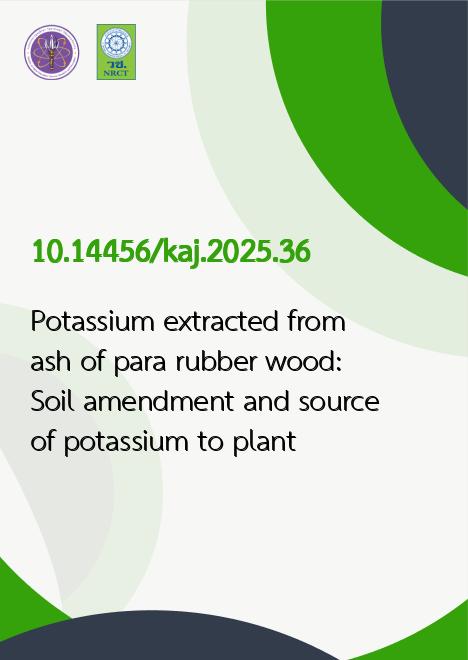
|
Potassium extracted from ash of para rubber wood: Soil amendment and source of potassium to plant |
|---|---|
| รหัสดีโอไอ | |
| Creator | Chakkrit Poonpakdee |
| Title | Potassium extracted from ash of para rubber wood: Soil amendment and source of potassium to plant |
| Contributor | Chanon Punmanee, Jumpen Onthong, Khwunta Khawmee |
| Publisher | Faculty of Agriculture |
| Publication Year | 2568 |
| Journal Title | Khon Kaen Agriculture Journal |
| Journal Vol. | 53 |
| Journal No. | 3 |
| Page no. | 491-503 |
| Keyword | ash, potassium fertilizer, environmentally friendly material, organic material |
| URL Website | https://li01.tci-thaijo.org/index.php/agkasetkaj |
| Website title | Khon Kaen Agriculture Journal |
| ISSN | 3027-6497 (Online) |
| Abstract | Most soils in Thailand are acidic and have low potassium (K) content, which restricts plant growth. Therefore, it is necessary to improve the soil and apply K fertilizer. Currently, potassium is extracted from rubber wood ash (PEA) to create soil amendment and source of K to plant. This research aims to study the effects of K extracted from rubber wood ash on plant growth and nutrients concentration in plant. Maize was grown in pots with three different treatment conditions: no K application, PEA application at the rates of 100400 mg K2O/kg, and KCl application at 100 mg K2O/kg. The results showed that the growth of maize with both PEA and KCl at the rate of 100 mg K2O/kg did not show significant differences. The application of PEA not only promoted plant growth, but also increased the nutrients concentration, especially K in the plant tissues. Furthermore, the application of PEA also increased soil pH value. Therefore, PEA is an alternative source of K for plants and enhance soil pH. In soils with low K content where maize is grown, applying PEA at the rate of 100 mg K2O/kg is recommended. |